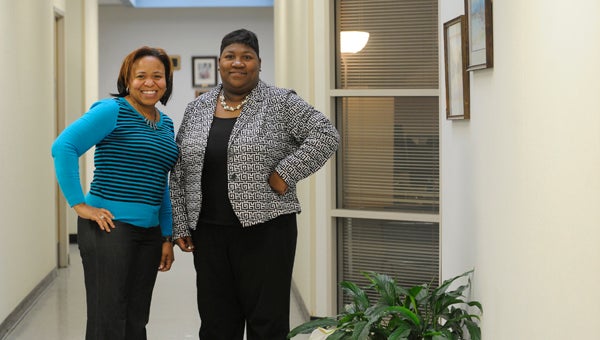Social services seeks those interested in fostering children
Published 7:48 pm Friday, February 5, 2016

VAIL STEWART RUMLEY | DAILY NEWS
FOSTER PROGRAM PARENTS: Shirley Williams, foster home licensing social worker, and Lisa Gibbs-Lee, child welfare supervisor, are reaching out to residents who are considering becoming a foster parent. A foster parent/adoption orientation will be held at Beaufort County DSS on Wednesday at 5:30 p.m.
Beaufort County Department of Social Services is reaching out to families and individuals, those with an affinity for children, who have both the heart and the right intentions to help children in need.
DSS is hosting a foster parent/adoption orientation panel Wednesday at 5:30 p.m. Anyone interested in learning about becoming a foster/adoptive parent is invited to attend the panel that includes current licensed foster and adoptive parents, child advocates, social workers and DSS management. Attending the panel discussion is not an obligation to participate, according to Shirley Williams, DSS foster home licensing social worker. It’s simply the first step in deciding whether fostering is for you, Williams said.
“If you’re remotely interested, come to the orientation,” said Lisa Gibbs-Lee, DSS child welfare supervisor.
Right now, there are 35 individuals and families accepting foster children in Beaufort County, but there is a need for more.
“Thirty-five is the most we’ve ever had, and we’re still looking to grow that, but we’re looking for quality,” Williams said.
One of the issues is age — those who take in foster children can determine the age range of children they will accept into their home. All will take in younger children, but the older a child is, the more challenging it is to find placement, according to Gibbs-Lee. Only four or five families will take in teenage foster children, and it’s much harder to place a teenage boy than a teenage girl, she said.
“Up to eight or nine (years old) is fine. After that, it’s not so easy to place 10 and up,” Gibbs-Lee said.
“The more you’re able to broaden the age range, the more you’re able to help when there is a need,” Williams said.
That need can come at any time: late at night, after an arrest of a parent leaves children home alone; or the morning of a court date that already been postponed twice that week. It can be a matter of fostering for a couple of days or for longer periods of time. Many of the children have gone through trauma that has landed them in foster care. The keys to being a successful foster parent lie in flexibility and the ability to build relationships with both DSS and the families of the children fostered, Williams said.
“You have to be able to work with families. It’s not just the child. It’s families helping families,” Williams said. “The best part of this job is when you have a foster parent who connects with the biological parent and can help them.”
The two women make a point of building relationships with their foster parents — they know when birthdays are and offer constant support. According to Gibbs-Lee, the unpredictable nature of the job demands that those ties are strong.
“People sometimes get licensed and months and months go by without a placement. We need you to be there when we need you.” Gibbs-Lee said. “We have to have a relationship that we can call on our foster parents at 2 a.m. … It’s a very serious job, serious work, but you have to be relaxed about it.”
Fostering is open to anyone over 21 years of age, whether single, married, widowed or divorced. Other basic requirements for foster parents include having a high school diploma or GED, an adequate income/stable employment, their own housing and reliable transportation. Foster parents must have a fingerprint and local background check, health screenings, fire and environmental inspections, family interviews and reference checks. Most important, is that foster parents, as well as any adult in the home over 21 yeas of age) must complete a 30-hour MAPP (Model Approach to Partnerships in Parenting) course, after the initial panel orientation.
It’s a combination of training and foster social workers getting to know potential foster parents — as is necessary, Gibbs-Lee said.
“At the end of the class, if you say, ‘This is not for me,’ we respect that,” Williams said.
For more information about Wednesday’s orientation panel, call Shirley Williams at 252-940-6023. Beaufort County DSS is located at 632 W. Fifth St., Washington.





